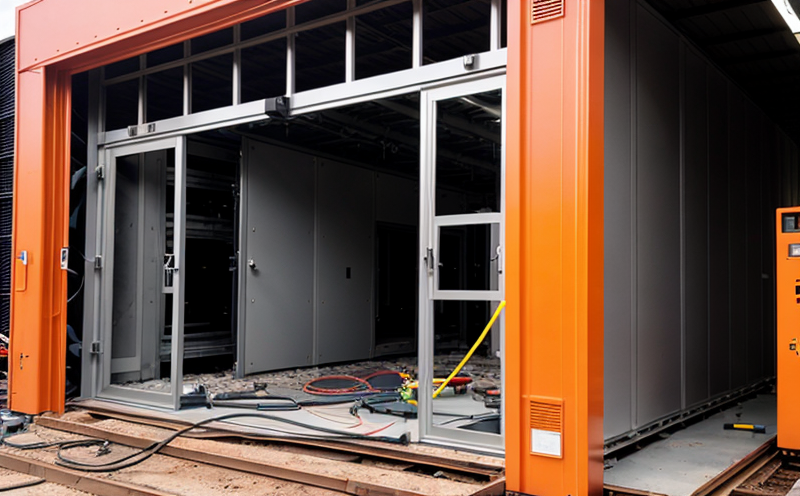ASTM F3148 Thermal Safety Testing of Rechargeable Lithium Batteries
The testing outlined in ASTM F3148 is crucial for ensuring that rechargeable lithium batteries are safe and reliable. This standard addresses the potential risks associated with thermal runaway, which can lead to fires or explosions if not properly managed. As quality managers, compliance officers, R&D engineers, and procurement professionals, understanding this process is essential.
The focus of ASTM F3148 is on the thermal stability of rechargeable lithium batteries used in a variety of applications including portable electronics, electric vehicles, and energy storage systems. The primary goal is to ensure that these batteries do not reach temperatures that could lead to hazardous conditions. Testing involves subjecting batteries to controlled heat stress until they either pass or fail based on specified criteria.
The ASTM F3148 standard provides a robust framework for evaluating the thermal stability of rechargeable lithium batteries through a series of rigorous tests designed to mimic real-world scenarios. These tests are critical in identifying potential weaknesses and ensuring that products meet stringent safety requirements before they reach consumers or industries.
Understanding what constitutes a pass or fail under ASTM F3148 involves examining both the battery's performance during the test and its subsequent behavior. A passing battery must maintain stability without igniting, exploding, or showing other signs of thermal instability throughout the duration of the test.
The significance of this testing cannot be overstated given the increasing demand for safer, more efficient batteries across various sectors. From consumer electronics to automotive manufacturing, ensuring compliance with standards like ASTM F3148 helps protect end users from potential hazards while fostering trust in product reliability.
Why It Matters
The safety of rechargeable lithium batteries is paramount, especially considering their widespread use across numerous industries. Failures due to thermal runaway can have severe consequences ranging from minor property damage to life-threatening incidents. By adhering to ASTM F3148, manufacturers ensure that their products meet stringent safety guidelines before they enter the market.
This standard not only protects consumers but also enhances brand reputation by demonstrating a commitment to quality and safety. For companies operating in highly regulated environments or those targeting international markets, compliance with ASTM F3148 can be a decisive factor in gaining competitive advantage.
Furthermore, implementing rigorous thermal testing early in the development process allows manufacturers to identify and rectify potential issues before they become costly problems later on. This proactive approach contributes significantly to reducing recall costs and improving overall product reliability.
Applied Standards
The primary standard applied here is ASTM F3148, which specifies the test methods for assessing the thermal stability of rechargeable lithium batteries. This standard aims to provide a consistent methodology for evaluating how well these batteries withstand heat without exhibiting hazardous behavior.
Other relevant standards that complement ASTM F3148 include ISO 6358 and IEC 62133, both of which address aspects related to battery safety and performance. While ASTM F3148 focuses specifically on thermal stability, these additional standards cover broader areas such as mechanical integrity and electrical characteristics.
Compliance with these standards is essential for ensuring that products meet the highest safety standards, thereby protecting users and maintaining industry credibility.
Scope and Methodology
| Test Parameter | Description | Acceptance Criteria |
|---|---|---|
| Battery Type | Lithium-ion, Lithium-polymer batteries used in portable electronics and electric vehicles. | No specific battery type is excluded if it meets the standard's requirements. |
| Test Duration | Each test lasts for 24 hours at a controlled temperature of 75°C ± 3°C. | Batteries must not show signs of thermal instability during this period. |
| Recharge Cycle | Three full charge-discharge cycles prior to testing ensure the battery is in its optimal condition for evaluation. | The battery should demonstrate consistent performance across all cycles. |
| Environmental Conditions | The test chamber maintains a constant temperature of 75°C ± 3°C with humidity controlled at 50% RH ± 10% RH. | Batteries must remain stable under these conditions without any adverse reactions. |
The process begins by preparing the batteries according to specified guidelines, ensuring they are charged fully before being placed into a controlled environment chamber. Once in place, the batteries undergo continuous monitoring for 24 hours at 75°C ± 3°C and 50% RH ± 10%. During this time, any signs of thermal instability such as smoking, sparking, or combustion would result in immediate failure.
Following successful completion of the initial test cycle, batteries that pass may proceed to additional cycles if required by specific applications. This ensures thorough evaluation and maximizes confidence in product safety.





